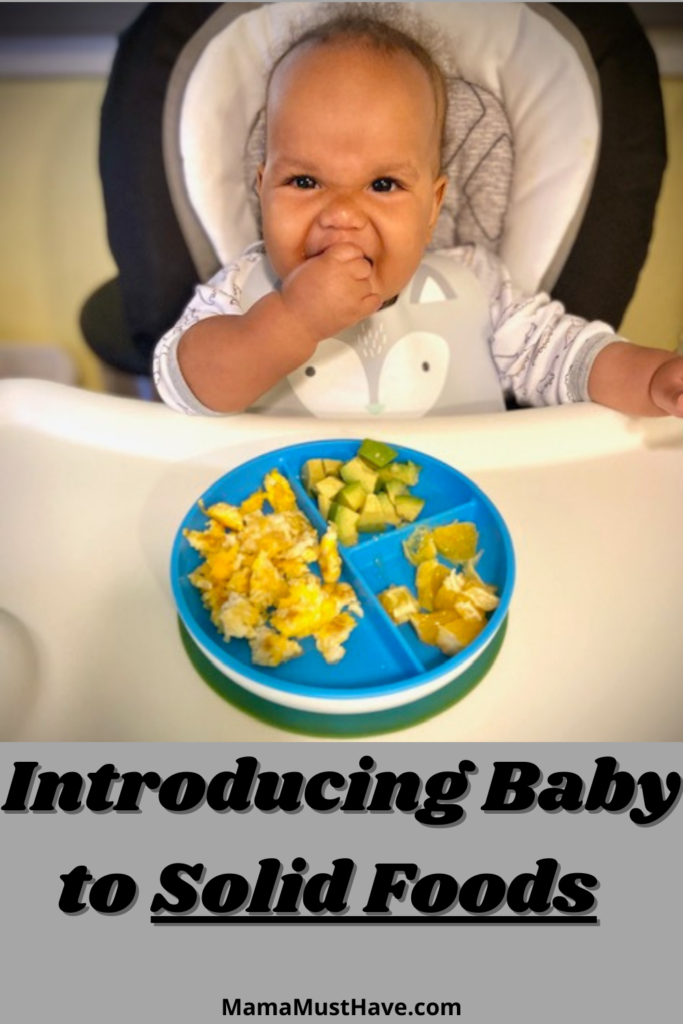Last Updated on 07/01/2021 by Mama Must Have

Introducing solid foods to your baby is an exciting milestone but a messy one too. Until now, your baby’s first and only food was breastmilk or formulas. But as your baby grows, you need to introduce your little one to the process of eating while sitting up, taking food from a spoon, resting between bites, and stopping when full. However, all this will come only after your baby’s digestive system learns to process solid foods. So let’s learn about introducing solid foods to your baby.
Note: Some of the links in this post are affiliate links. At no additional cost to you, if you click through and make a purchase, I will earn a commission.
How to know it’s time to start solids?
Solids are usually started when your baby is around 6 months old. The exact time depends on the particular baby so keep an eye out for signs of readiness the baby shows. Be sure to also get the okay from your pediatrician. These signs can help you know it’s time for baby’s first solid food.
- Your baby can sit upright and hold up their head.
- Baby becomes aware of surroundings and gets curious about foods you are eating.
- The important thing to know will be that your baby has lost the tongue-thrust reflex. You can test it by offering a spoon of baby cereal. If your baby pushes it out of their mouth and/or dribbles onto their chin, then your baby might not have developed the ability to move it back to the mouth and swallow the food.
Important tip – Do not rush to reach this milestone. Never offer solid foods before your baby is at least 6 months old as the baby’s digestive system is not developed enough.
Shop EZPZ Mealtime products and get 25% off
Tips to get your baby started
As soon as you are sure that your baby is ready to eat solid foods, you’ll need to focus on developing their food habits. Plus, you need to know what to give to your baby and what not to. Some tips to get your baby started on solid foods.
- Introducing your baby to solid foods takes time
Your baby will take some time to get used to the new sensation of chewing, swallowing, digestion, etc. The taste and texture of solid foods are all new feelings for your baby at the beginning. Your baby may not like it but try offering spoon after spoon and your baby will eat. Don’t feel stressed if your baby is not developing taste for solid foods. Instead, give time to this process, and the results will be fruitful.
- Schedule meal times
You might be surprised that unlike adults, babies need to focus while eating. So it is definitely going to help you if you turn off the TV or loud music when you sit your baby down to eat. Also, create a routine of the mealtime with specific intervals. This process is also going to test your patience, but it is one of the important tips to get your baby started on solid food.
- Be prepared for the mess
Always remember that your baby is learning and has a long way to go. So your baby is likely to create a mess until their coordination is better. Utilize this First Foods Set as your baby learns how to use spoons and cups.
- Don’t overcomplicate it.
There’s no need to have different plates and spoons. Feel free to simply put the baby’s food on their high chair tray and allow them to explore with their hands. If you start with a plate early on there’s a big chance that the plate along with all the food will end up on the floor.
5. Pick a seat that will work well for both you and the baby.
There’s a lot of options when it comes to high chairs so it’s good to do your research on what you think would work best for you. If you travel a lot and need to have something that can travel with you, consider this highchair as an option that can easily be transported. This chair is also beneficial if you don’t have the space for a large highchair. Another option is getting something that can grow with your child. This 5-in-1 highchair can be used asearly as the newborn phase and eventually transitions to a booster seat. It can also be used for 2 kids at once!
Final words
Introducing solid foods to your baby will be a test of your patience and you’ll need to keep an eye out for allergies and food intolerances as well. Get help from your pediatrician immediately in case of any allergic reactions.
As your baby is growing and enjoying new foods, make sure to make your home a safe environment for them. Check out our article on Babyproofing Your Home.
